高中英语必修五 语法
高中英语必修五知识点和语法总结
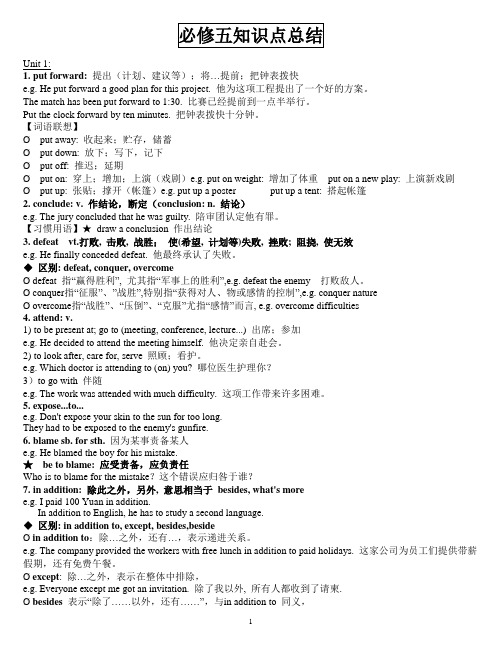
Unit 1:1. put forward: 提出(计划、建议等);将…提前;把钟表拨快e.g. He put forward a good plan for this project. 他为这项工程提出了一个好的方案。
The match has been put forward to 1:30. 比赛已经提前到一点半举行。
Put the clock forward by ten minutes. 把钟表拨快十分钟。
【词语联想】Ø put away: 收起来;贮存,储蓄Ø put down: 放下;写下,记下Ø put off: 推迟;延期Ø put on: 穿上;增加;上演(戏剧)e.g. put on weight: 增加了体重put on a new play: 上演新戏剧Ø put up: 张贴;撑开(帐篷)e.g. put up a poster put up a tent: 搭起帐篷2. conclude: v. 作结论,断定(conclusion: n. 结论)e.g. The jury concluded that he was guilty. 陪审团认定他有罪。
【习惯用语】★draw a conclusion 作出结论3. defeat vt.打败, 击败, 战胜;使(希望, 计划等)失败, 挫败; 阻挠, 使无效e.g. He finally conceded defeat. 他最终承认了失败。
◆区别: defeat, conquer, overcomeØ defeat 指“赢得胜利”, 尤其指“军事上的胜利”,e.g. defeat the enemy 打败敌人。
Ø conquer指“征服”、”战胜”,特别指“获得对人、物或感情的控制”,e.g. conquer natureØ overcome指“战胜”、“压倒”、“克服”尤指“感情”而言, e.g. overcome difficulties4. attend: v.1) to be present at; go to (meeting, conference, lecture...) 出席;参加e.g. He decided to attend the meeting himself. 他决定亲自赴会。
人教版版高中英语必修五重点语法汇总

必修5重点语法汇总Unit1过去分词做定语和表语1. 过去分词作定语1)语法功能过去分词或过去分词短语作定语时,其功能相当于一个定语从句。
被修饰的词是分词所表示的行为的承受者;在逻辑上,它们是动宾关系。
The stolen bike belongs to Jack. The bike which was stolen belongs to Jack.The lecture given by Professor Zhang is about environment protection.The lecture which was given by Professor Zhang is about the environment protection.a.单个的过去分词作定语时,位于它所修饰的名词或代词前面the affected people受感染的人 a broken heart一颗破碎的心a lost dog丧家之犬 a broken glass被打破的玻璃杯Attention:过去分词修饰something, everything, anything, nothing, somebody, nobody, those 等不定代词时,要放在这些词后面。
Is there anything unsolved?There is noting changed here since I left this town.b.过去分词短语作定语:通常后置,其作用相当于定语从句。
people exposed to cholera= people who was exposed to cholerathe book recommended by Jack= the book which was recommended by Jackthe machines produced last year= the machines which were produced last yearc. 不及物动词的过去分词作定语时不表被动,只表完成。
高二英语必修五 语法过去分词作状语
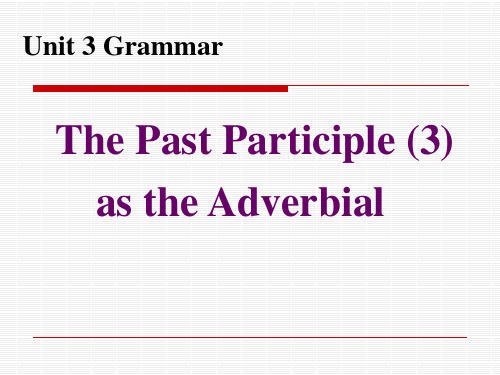
Compare
1. Following the old man, we went
upstairs. (__W_e__ followed _t_h_e_o_l_d_m__a_n) (跟着那个老人, 我们上了楼。)
2. Followed by the old man, we went
upstairs. ( W__e_w__e_re_followed _b_y_t_h_e old) man (我们上了楼, 后面跟着那个老人。)
-ed分词(短语)作状语时,也可在其前面加上连 词when, if, once, though, unless等,以便明确 作何种状语。
1. 时间状语
时间状语可在过去分词前加上连词when, while, until等。 When it is seen from the hill, the park looks very beautiful. Seen from the hill…
-ing分词作状语, 表时间
=When we see from the top of the hill, we find
the city looks like a big garden.
_S_e_e_n_f_r_o_m__t_h_e_t_o_p_o_f__th_e__h_il_l(从山顶上看), the city looks like a big garden. (see)
As he was surprised at what happened, Tom didn’t know what to do.
Surprised at what happened…
3. 条件状语
If we were given more time, we could do it much better. Given more time…
必修五unit 语法

2.
A. B.
ET( hveeexrcnyibeteowdds,yeiswxcvaiestirnyegx)ecixtecidtintog
hear the indeed.
news.
3. A. The result of the test was rather disappointing.
1. B. He was vedryisappointed at the result of the
3. The castle, which was burnt down in the sixteenth century, was never rebuilt.
= The castle, __b_u_r_n_t_d_o_w_n__in__ _th_e__si_x_t_ee_n_t_h_c_e_n_t_u_ry___, was
练习三 单选
1.A__s_Ai_s_k_n,owbnuttoweusofatlle,ntfreaevel l_in_g_i_s__
when we are back from travels.
2. A. interesting; tired B. interested; tiring C. interesting; tiring D. interested; tired
(2)被动语态的过去分词,动作意味很强,句 子主语为动作的承受者,后常跟by短语。
The glass was broken by Jack. The windows were closed by Tom last night.
现在分词与过示主动的动作 过去分词: 表示已经被动的动作
A. knowing
B. known
C. being known
人教课标版高中英语必修5 Unit5_单元语法详解
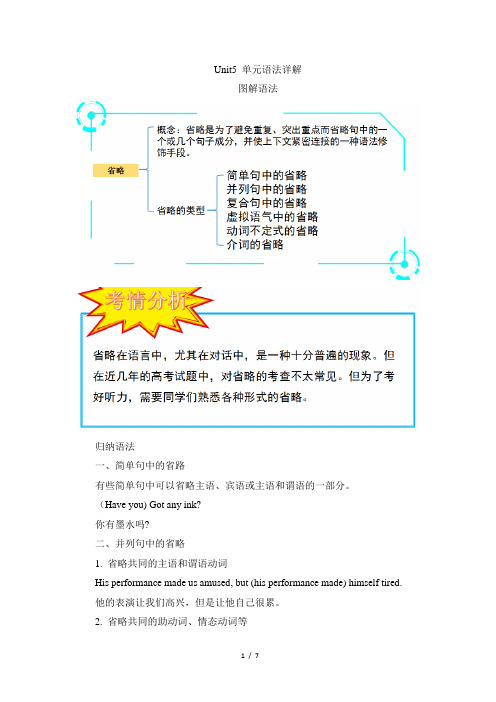
Unit5 单元语法详解图解语法归纳语法一、简单句中的省路有些简单句中可以省略主语、宾语或主语和谓语的一部分。
(Have you) Got any ink?你有墨水吗?二、并列句中的省略1. 省略共同的主语和谓语动词His performance made us amused, but (his performance made) himself tired. 他的表演让我们高兴,但是让他自己很累。
2. 省略共同的助动词、情态动词等Xiaoming must have been playing football at that time, while his sister ( must have been) playing the piano.那时小明一定在踢足球,而他妹妹一定在弹钢琴。
三、复合句中的省略1. 定语从句的省略如果关系代词在定语从句中作宾语,这个关系代词通常可以省略。
Do you remember the place (which/that) we visited last year?你还记得我们去年参观的那个地方吗?He's the man (who/that) you can safely depend on.他是你能放心信赖的人。
2. 宾语从句的省略①及物动词后接宾语从句时,连接词that一般可以省略,但如果及物动词后接两个或两个以上由that引导的宾语从句时,那么只有第一个that可以省略。
He said (that) the text was very important and that we should learn it well.他说这篇课文很重要,我们应该把它学好。
②when,where, how和why引导的宾语从句有时可以仅保留引导词。
I know that a movie star will come to our city but I don't know when (he/she will come to our city) .我知道一个电影明星要来我们城市,但我不知道他/她什么时候来。
必修五unit4语法
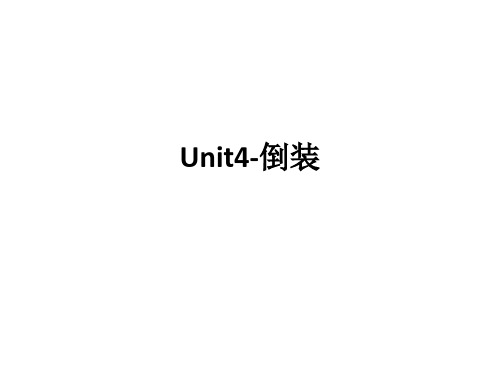
四、表语句首主语长, 句子平衡需 倒装。
• 1)such做表语,位于句首时, • 2 句子主语部分长,谓语部分较短或为了强 调句子的表语时,为了保持平衡,用完全 倒装。
端单词,6 月底期末考试。 • 2 预习语法倒装,并完成51页练习题。 • 3 课时作业练习题:85页-1 • 87页-1 • 89页-1、3 • 90页-4
一、副介开头全倒装,遇到代词则 照常
2)表示方位的介词短语位于句首,句子的谓 语是表示存在意义的动词(lie/ stand/ exist/ live/ sit)时,用完全倒装
二、方位方式别遗忘,上下进出往 前放
• 表示运动方向的副词out/ up/ in/ down/ away等置于句首时,谓语动词表示运动的 动词,且主语为名词时,句子用完全倒装; 主语为代词时,则不倒装。
三、 there, here用得上,时间顺序 句首放。
1)here,there,now,then等地点或时间状 语,且谓语动词为be ,come, go, remain, lie,run等,主语为名词时,用完全倒装。 主语为代词时,则不倒装。 2)there be句型用完全倒装。 be/ stand/ live/ exist/ lie/ remain/ seem/ appear
Unit4-倒装
倒装句
• 英语的一般语序是“主+谓+其他部分”, 即主语在前,谓语在后。但有时出于语法 和修辞上的需要,把谓语的全部或者一部 分放在主语之前,这种语序称为倒装。 • 1)将谓语完全放在主语之前称为完全倒装。 • 2)将系动词、助动词或情态动词置于主语 之前,称为部分倒装
完全倒装
• • • • 副介开头全倒装,遇到代词则照常。 方位方式别遗忘,上下进出往前放。 there, here用得上,时间顺序句首放。 表语句首主语长, 句子平衡需倒装。
必修五语法部分
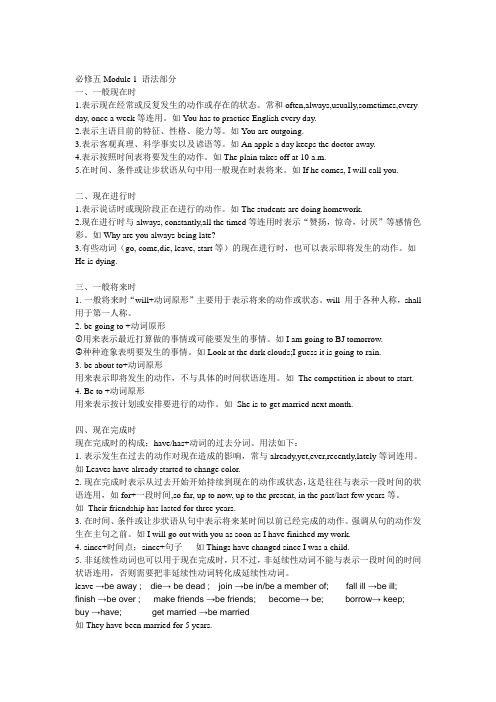
必修五Module 1 语法部分一、一般现在时1.表示现在经常或反复发生的动作或存在的状态。
常和often,always,usually,sometimes,every day, once a week等连用。
如You has to practice English every day.2.表示主语目前的特征、性格、能力等。
如You are outgoing.3.表示客观真理、科学事实以及谚语等。
如An apple a day keeps the doctor away.4.表示按照时间表将要发生的动作。
如The plain takes off at 10 a.m.5.在时间、条件或让步状语从句中用一般现在时表将来。
如If he comes, I will call you.二、现在进行时1.表示说话时或现阶段正在进行的动作。
如The students are doing homework.2.现在进行时与always, constantly,all the timed等连用时表示“赞扬,惊奇,讨厌”等感情色彩。
如Why are you always being late?3.有些动词(go, come,die, leave, start等)的现在进行时,也可以表示即将发生的动作。
如He is dying.三、一般将来时1.一般将来时“will+动词原形”主要用于表示将来的动作或状态。
will 用于各种人称,shall 用于第一人称。
2.be going to +动词原形①用来表示最近打算做的事情或可能要发生的事情。
如I am going to BJ tomorrow.②种种迹象表明要发生的事情。
如Look at the dark clouds;I guess it is going to rain.3.be about to+动词原形用来表示即将发生的动作,不与具体的时间状语连用。
如The competition is about to start.4.Be to +动词原形用来表示按计划或安排要进行的动作。
人教课标版高中英语必修5 Unit3_单元语法详解

Unit3 单元语法详解过去分词作状语归纳语法过去分词作状语,其逻辑主语与句子主语一致,句子主语与过去分词所表示的动作之间存在逻辑上的被动关系。
过去分词作状语时一般与句中其他成分用逗号隔开,可以表示时间、原因、条件、方式、伴随状况等。
1. 表示时间。
相当于when,while等引导的时间状语从句。
Asked what had happened(=When he was asked what had happened) , he lowered his head.当被问到发生了什么事情的时候,他低下了头。
2. 表示原因。
相当于because,since,as等引导的原因状语从句。
Absorbed in painting(=As he was absorbed in painting) , John didn't noticeevening approaching.由于在全神贯注地画画,约翰没有察觉到夜幕降临了。
3. 表示条件。
相当于if引导的条件状语从句。
Given another hour(If I am given another hour) , I can also work out this problem.如果再给我一个小时,我也能把这道题算出来。
4. 表示让步。
相当于although,though,even if,even though等引导的让步状语从句。
Beaten by the opposite team(Though we were beaten by the opposite team) , we didn't lose heart and encouraged each other.虽然被对方的队打败了,但我们并没有灰心并且相互鼓励。
5. 表示方式或伴随。
The woman scientist entered the lab, followed by her assistants.这位女科学家进入了实验室,后面跟着她的助手。
- 1、下载文档前请自行甄别文档内容的完整性,平台不提供额外的编辑、内容补充、找答案等附加服务。
- 2、"仅部分预览"的文档,不可在线预览部分如存在完整性等问题,可反馈申请退款(可完整预览的文档不适用该条件!)。
- 3、如文档侵犯您的权益,请联系客服反馈,我们会尽快为您处理(人工客服工作时间:9:00-18:30)。
He earned enough credits for his degree. credit v.(1)相信,信任 He told me he’d just won the first prize—would
7.Now when people refer to England you
find Wales included. find sth done发现...被...其中done为过去 分词,在这一结构中做宾补,sth和done之 间是被动关系
e.g.When he returned at midnight,he
I’m not going to organize my day entirely for your convenience. We have provided seats for the convenience of our customers. at one's convenience 在某人方便的时间(或地点) Can you telephone me at your convenience to arrange a meeting?
To his credit, he never told anyone exactly what had happened.
It’s much to her credit that she preserved
in spite of all the difficulties.
(2)借款;赊帐 credit card 信用卡
safely accomplished. 9.conflict
(1)n 冲突 a conflict between two cultures两种文化的 冲突 (2)矛盾,抵触
The story tells of a classic conflict between love and duty.这故事讲的是典型的爱情与责任之 间的矛盾 (3)vi 冲突,抵触
The beauty of Venice consists in the style of its ancient buildings.
e.g 这个学校有72个教学班.
__T_h_e_r_e_a_r_e__ 72 classes in this school.
72 classes_m_a_k__e_u_p__ this school. This school__co_n__si_s_ts__o_f 72 classes. This school___is__m_a_d__e_u_p__o_f __72 classes.
divide separate divide 整体分为若干部分. separate 指把原来合在一起的或靠在一起 的人和物分离开来.
• The contry is _d_i_v_id_e_d_ into 12 provinces. • The apple was _d_iv_i_d_e_d in two/half. • We _d_i_v_id_e_d_the money equally. • Oxygen can be s_e_p__a_ra_t_e_d_from water.
e.g She,as well as the other students,__h_a_s__ completed
the experiment. 3) as well as位于句首,“除了…之外,还(又)” =apart from As well as Lucy and Jack, Terry went to the park.
(2) [C] 便利的事物(或设施) It was a great convenience to have the school so near. The school had all the modern conveniences that were unusual at that time. convenient adj. 方便的, 便利的 a convenient place/ time It be convenient for sb. to do sth.… 某人做某事方便 if it is convenient to/for sb.… 如果某人方便(的话)。 convenient作表语时,不能用表示人的名词或代词作主 语。
She asked him to clarify what he really
meant. 她要他说明他到底什么意思。 纯净,净化(黄油)
This is some clarified butter. 这是一些已经净化的黄油。 你能想出几个-fy/-ify结尾的词吗? beautify(美化) purify(使纯洁) simplify (使简单化)
2. England can be divided into three main areas. 英国可以分成三大部分。 divide 意为“把一个整体分成若干个部 分” 常与 into, among, between 搭配 divide into 把…分成 divide sth. between/among/with sb. 在 …分配 separate A from B 使分离; 使分开
The old soldier referred to his experiences during the Long March. 老战士谈到了长征时的 一些经历。
(3). 适用于,涉及到
These books refer to Asian problems. 这些书涉及到亚洲问题。
These regulations refer only to children. 这些规矩只适用于儿童。 ※ refer to...as... “把……称作……” He is referred to as a living Lei Feng. 他 被称作是一个活雷锋。
The results of the new research would seem
to conflict with existing theories. 新的研究成果似乎和已有的理论相抵触 conflict with与...冲突 in conflict with与......相冲突
10.break away (from) (1)突然挣脱; 逃脱 The prisoner broke away from the guards and escaped. (2)脱离;背叛 The American southern states wanted to break away (from the Union). 11.credit n.(1)赞扬 You could at least give him some credit for all the effort he’s put in. to sb’s credit 值得赞扬(钦佩)某人, 为某人带 来荣誉
6.as well 与 as well as
1) as well 通常位于句末,表示“也,又同样”
e.g Electricity is widely used in industry and in daily life as well.
2) as well as 连接两个并列的成分做主语,意为“和, 也又”,谓语动词与前面的主语保持一致.
1. consist vi. 1) 由……组成; 由……构成(与of 连用,不用于进行式)(=be made up of)
2)在于;存在于;以……为主(与in连用, 无被动式) 委员会由七名成员组成.
The committee consists of seven members. 水由氢和氧构成.
Water consists of hydrogen and oxygen. 什么才算是幸福呢? What does happiness consist in? 威尼斯之美就在于它具有古代建筑物的风格.
• The Taiwan Strait _s_e_p_a_r_a_t_e_s Taiwan from Fujian.
• The prize money will be equally
d_i_v_i_d_e_d_between/among the three winners.
3. puzzle n. 1)谜;难题;玩具
vi. 迷惑;苦思 这个问题我想了好半天.
I puzzled over the question for quite 事物)清楚易懂 ,澄清
I hope that what I say will clarify the
situation . I hope this clarifies my position.我希望这 能阐明我的立场。
found his house broken into. find 带复合宾语时,做宾补的除了过去分词 以外,还可以是adv,adj,prep,v-ing
He was found dead in the morning. He found himself in hospital when he woke up. When he woke up in the morning,he found all the lights in his house on. He found the people living better than ever before. 他看到人民生活比过去任何时候都好。 Tom found the girl walking in the direction of the small village.
you credit it? (2) be credited to 把…归功于… The defeat of cholera was credited to John
